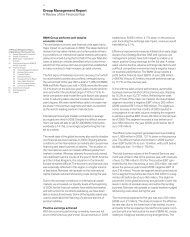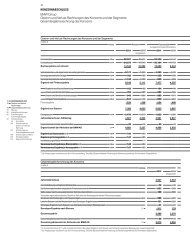Article by Prof. Dr. Hans Hunfeld (PDF, 151 KB). - BMW Group
Article by Prof. Dr. Hans Hunfeld (PDF, 151 KB). - BMW Group
Article by Prof. Dr. Hans Hunfeld (PDF, 151 KB). - BMW Group
You also want an ePaper? Increase the reach of your titles
YUMPU automatically turns print PDFs into web optimized ePapers that Google loves.
(idealized) diminished (lesser breed), used (exploited), fought in war (enemy), and subjected<br />
(colonized). His/her characteristics were ascribed to him/her from the perspective of one’s<br />
own familiar culture. In a way, even his or her existence was the result of his discovery <strong>by</strong><br />
those who named him/her on the basis of their own world view and tradition. He or she<br />
was seldom allowed to speak since those who defined themselves through their technical<br />
progress and cultural superiority did most of the talking for him/her. The taken-for-granted<br />
dominance of the familiar facilitated such ascriptions and the relationship between normalcy<br />
and the “foreign other” was there<strong>by</strong> unilaterally determined and regulated. 7<br />
The reality of for example Europe or of the US today has, on the other hand, established<br />
the normalcy of the foreigner. This fact forces us to reconsider our conceptual gambits: the<br />
“foreign other” is no longer an extraordinary but rather a quite ordinary phenomenon. Indeed,<br />
the experience of the “other”, the foreigner, has become the normal. The living together of<br />
various ethnic groups can no longer be mastered <strong>by</strong> the self-assuredness of distance, which<br />
has disappeared not only in its spatial dimension. The “foreign other” speaks for himself,<br />
he or she no longer subordinates himself/herself to speeches made on his/her behalf, but<br />
instead wants to be heard. Since language functions not only as a mean of transmitting<br />
information but also as a constitutive element of our “world”, the ordinary presence of the<br />
“foreigner” also changes our traditional conceptual frameworks. Normalcy and otherness<br />
(foreignness) become mutually constituted distinctions, which are, however, no longer<br />
unilaterally determined. Intercultural learning alerts us to these facts of life and changes our<br />
traditional ways of conceiving of the world. 8<br />
1.4 The limits of understanding<br />
The existence of the foreigner among us does not depend upon individual capacity for<br />
understanding 9 .<br />
To conceive of understanding as a subsumption of the “other” under one’s own interest or<br />
life-plans is ruled out <strong>by</strong> the recognition that “otherness” and foreignness are ascriptions<br />
and not essential characteristics of persons and groups. The great variety of cultural and<br />
linguistic “others” limits our capacity for understanding. However, difference is legitimate<br />
even if it is not always “understood” <strong>by</strong> others. This lack of understanding does not relieve us<br />
from efforts to understand the other, and it does not legitimate our indifference towards it.<br />
Rather, it demands tolerance when the coexistence of people who experience each other as<br />
strangers has to be secured and when the acceptance of “otherness” cannot be based on an<br />
understanding of its character. Intercultural learning means therefore the reflective experience<br />
of the normalcy of the “foreign other” as a type of normalcy which is different and transcends<br />
one´s own capacity for understanding, but which is neither better nor worse than the familiar<br />
normalcy. 10<br />
1.5 The flexibility of “culture”<br />
The variety of cultural expressions is paralleled <strong>by</strong> attempts to classify them. 11 However, the<br />
syncretistic character of contemporary cultures, their mutual influences and impacts, calls<br />
static definitions into question. Intercultural dialogues and influence attempts are normal and<br />
ordinary phenomena; what is one’s “own” can hardly be determined with precision. Culture in<br />
modern societies consists rather in the simultaneous action of different modes of perception,<br />
traditions and customs which are changing all the time. Their boundaries are frequently rather<br />
diffuse. The contemporaneity of regional and global cultural phenomena, of understandings<br />
based on status and generational contexts, can no longer be subsumed under one single<br />
homogeneous concept of ”culture”. Every culture of one’s “own” is also dependent upon and<br />
develops within this overall process. Intercultural learning is therefore the lifelong realization of<br />
the mutual constitution and dependence of one’s own on the “foreign other”.


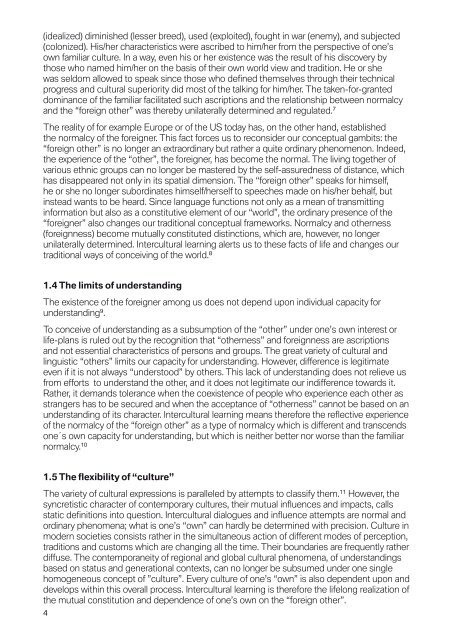
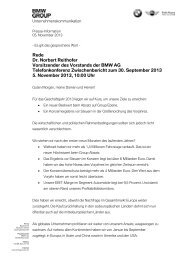
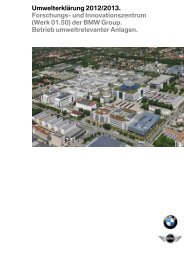

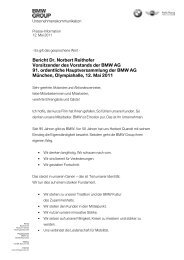
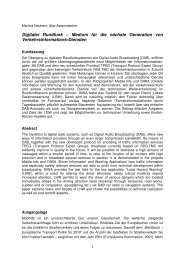
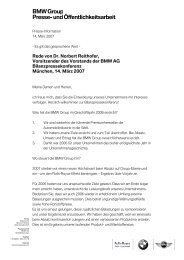
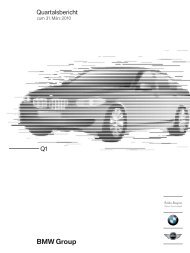
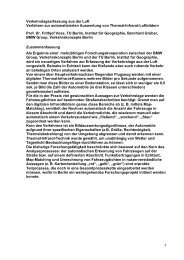
![Vollständiger Bericht [PDF] - BMW Group](https://img.yumpu.com/20706531/1/190x238/vollstandiger-bericht-pdf-bmw-group.jpg?quality=85)



